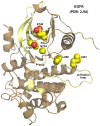Prediction and prioritization of rare oncogenic mutations in the cancer Kinome using novel features and multiple classifiers
- PMID: 24743239
- PMCID: PMC3990476
- DOI: 10.1371/journal.pcbi.1003545
Prediction and prioritization of rare oncogenic mutations in the cancer Kinome using novel features and multiple classifiers
Abstract
Cancer is a genetic disease that develops through a series of somatic mutations, a subset of which drive cancer progression. Although cancer genome sequencing studies are beginning to reveal the mutational patterns of genes in various cancers, identifying the small subset of "causative" mutations from the large subset of "non-causative" mutations, which accumulate as a consequence of the disease, is a challenge. In this article, we present an effective machine learning approach for identifying cancer-associated mutations in human protein kinases, a class of signaling proteins known to be frequently mutated in human cancers. We evaluate the performance of 11 well known supervised learners and show that a multiple-classifier approach, which combines the performances of individual learners, significantly improves the classification of known cancer-associated mutations. We introduce several novel features related specifically to structural and functional characteristics of protein kinases and find that the level of conservation of the mutated residue at specific evolutionary depths is an important predictor of oncogenic effect. We consolidate the novel features and the multiple-classifier approach to prioritize and experimentally test a set of rare unconfirmed mutations in the epidermal growth factor receptor tyrosine kinase (EGFR). Our studies identify T725M and L861R as rare cancer-associated mutations inasmuch as these mutations increase EGFR activity in the absence of the activating EGF ligand in cell-based assays.
Conflict of interest statement
The authors have declared that no competing interests exist.
Figures



Similar articles
-
Machine Learning Classification and Structure-Functional Analysis of Cancer Mutations Reveal Unique Dynamic and Network Signatures of Driver Sites in Oncogenes and Tumor Suppressor Genes.J Chem Inf Model. 2018 Oct 22;58(10):2131-2150. doi: 10.1021/acs.jcim.8b00414. Epub 2018 Oct 3. J Chem Inf Model. 2018. PMID: 30253099
-
INTEGRATING GENETIC AND STRUCTURAL DATA ON HUMAN PROTEIN KINOME IN NETWORK-BASED MODELING OF KINASE SENSITIVITIES AND RESISTANCE TO TARGETED AND PERSONALIZED ANTICANCER DRUGS.Pac Symp Biocomput. 2016;21:45-56. Pac Symp Biocomput. 2016. PMID: 26776172
-
Sequence and structure signatures of cancer mutation hotspots in protein kinases.PLoS One. 2009 Oct 16;4(10):e7485. doi: 10.1371/journal.pone.0007485. PLoS One. 2009. PMID: 19834613 Free PMC article.
-
The molecular basis of targeting protein kinases in cancer therapeutics.Semin Cancer Biol. 2013 Aug;23(4):235-42. doi: 10.1016/j.semcancer.2013.04.001. Epub 2013 May 4. Semin Cancer Biol. 2013. PMID: 23651790 Review.
-
Point mutations of protein kinases and individualised cancer therapy.Expert Opin Pharmacother. 2006 Nov;7(16):2243-61. doi: 10.1517/14656566.7.16.2243. Expert Opin Pharmacother. 2006. PMID: 17059381 Review.
Cited by
-
Newly emergent acquired EGFR exon 18 G724S mutation after resistance of a T790M specific EGFR inhibitor osimertinib in non-small-cell lung cancer: a case report.Onco Targets Ther. 2018 Dec 18;12:51-56. doi: 10.2147/OTT.S188612. eCollection 2019. Onco Targets Ther. 2018. PMID: 30588029 Free PMC article.
-
Analysis of somatic mutations across the kinome reveals loss-of-function mutations in multiple cancer types.Sci Rep. 2017 Jul 25;7(1):6418. doi: 10.1038/s41598-017-06366-x. Sci Rep. 2017. PMID: 28743916 Free PMC article.
-
Analysis of Circulating Cell-Free DNA Identifies Multiclonal Heterogeneity of BRCA2 Reversion Mutations Associated with Resistance to PARP Inhibitors.Cancer Discov. 2017 Sep;7(9):999-1005. doi: 10.1158/2159-8290.CD-17-0146. Epub 2017 Apr 27. Cancer Discov. 2017. PMID: 28450426 Free PMC article.
-
Dark kinase annotation, mining, and visualization using the Protein Kinase Ontology.PeerJ. 2023 Dec 5;11:e16087. doi: 10.7717/peerj.16087. eCollection 2023. PeerJ. 2023. PMID: 38077442 Free PMC article.
-
A CATH domain functional family based approach to identify putative cancer driver genes and driver mutations.Sci Rep. 2019 Jan 22;9(1):263. doi: 10.1038/s41598-018-36401-4. Sci Rep. 2019. PMID: 30670742 Free PMC article.
References
-
- Hanahan D, Weinberg RA (2000) The Hallmarks of Cancer. Cell 100: 57–70. - PubMed
Publication types
MeSH terms
Substances
LinkOut - more resources
Full Text Sources
Other Literature Sources
Research Materials
Miscellaneous

